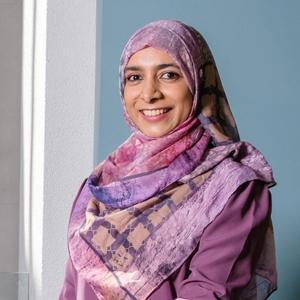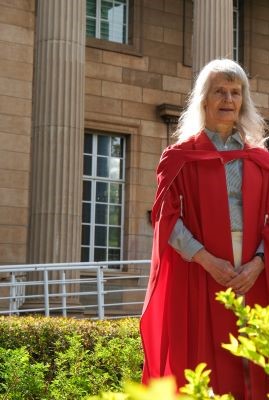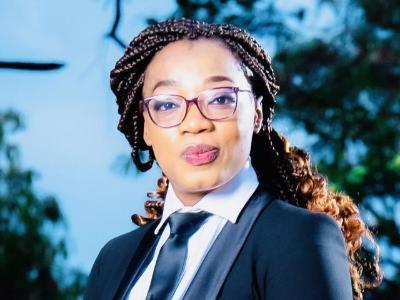Wits graduates sparkle at ‘Science Oscars’
- Wits Alumni Relations
Four alumni representing different institutions recognised at 2025 National Science and Technology Forum-South 32 Awards.
Twelve Wits graduates were among the finalists at the 27th NSTF-South32 Awards held on 31 July 2025. The annual awards ceremony, widely regarded as the “Science Oscars”, identifies excellence and outstanding contributions to science, engineering and technology and innovation in South Africa. They are the largest and most sought-after national awards of their kind in the country.
Four Wits graduates, representing different institutions of higher learning, were among winners including Shahida Moosa (MBBCh 2004, MMed2012), Anne Fitchett (BArch 1981, MSc Building 2002, PhD 2009), Rachael Dangarembizi (MSc Med 2012, PhD 2018) and Ryan Blumenthal (PhD Eng 2015).
Shahida Moosa
Prof Moosa, who is head of medical genetics at Tygerberg Hospital and professor of medical genetics at Stellenbosch University, was the winner in the Clinical Scientist category. She was acknowledged for her work in creating spaces where patient care and scientific discovery “go hand in hand”.
 As a paediatrician she found herself drawn to children with complex, unexplained conditions, many of these with an underlying genetic basis: “I became acutely aware early in my career of the stark inequities patients face across the country. While the rest of the world embraced genomic medicine, I was limited to outdated tests that often didn’t reflect our population’s diversity.”
As a paediatrician she found herself drawn to children with complex, unexplained conditions, many of these with an underlying genetic basis: “I became acutely aware early in my career of the stark inequities patients face across the country. While the rest of the world embraced genomic medicine, I was limited to outdated tests that often didn’t reflect our population’s diversity.”
She earned a doctorate in Germany and returned to South Africa to launch Genomics for Health in Africa, a programme offering free genetic testing and counselling, while training the next generation of African genomic scientists.
She says the award brings visibility to the need for equity in genomics: “We are proud to be part of a new era that moves beyond extractive, ‘helicopter’ science. The question is no longer whether we can do this in Africa, but how far we can lead.”
Ryan Blumenthal
Prof Blumenthal is a senior specialist forensic pathologist and associate professor at the University of Pretoria and he received the Communication Award. He completed a doctorate in engineering from Wits in 2015. He has become a public educator, translating forensic pathology into accessible narratives that captivate audiences. His bestselling book Autopsy (Jonathan Ball, 2020), was recently translated into Russian.
“Forensic pathologists are not just doctors, scientists or academics. We are a special kind of medical expert,” he says. “We do not break. We do not quit. We do what must be done.
“There are lessons to be learned about life when studying death. We perform autopsies not just to catch criminals, but to prevent unnecessary deaths. The same type of death should never happen twice.”
Science communication, he says, is one way to honour that oath and redress the imbalance in how society processes violent death. “The focus is almost always on the killers; even the court cases bear the names of the murderers, not those who died. It feels wrong.”
Anne Fitchett
Honorary associate professor in the School of Civil and Environmental Engineering Anne Fitchett (BArch 1981, MSc Building 2002, PhD 2009) was winner in the Management Engineering Research Capacity Development category for breaking barriers and creating new pathways for those historically excluded from engineering. “I’ve always believed our role as educators goes far beyond the lecture hall,” she says. “We are here to nurture lifelong learners and future problem-solvers who can carry the profession forward with innovation and integrity.”
In 2023 she was happy to bid farewell to late nights of completing administrative duties of exam timetables, but says “I love Wits. It’s been such a supportive and nurturing environment for my learning and teaching.”
Prof Fitchett led major curriculum reforms, including the introduction of a Common First Year — a foundational programme that replaced high failure rates with improved student success and deeper engagement. She also designed a part-time study track to address the thousands of eligible applicants turned away each year because of financial barriers. The programme spreads the first two years over four, with after-hours classes that allow students to work while studying. “It’s about giving people the tools and the time to succeed.”
Her focus on accessibility extended to physical and academic inclusion. Working with the Wits Disability Rights Unit, she helped pilot universal accessibility measures on campus, from infrastructure to tech-enabled learning.
Rachael Dangarembizi
Dr Rachael Dangarembizi (MSc Med 2012, PhD 2018) is a senior lecturer in the Department of Human Biology and a neuroscientist in the Neuroscience Institute at the University of Cape Town. She was named the TW Kambule-NSTF Award: Emerging Researcher winner.
“Growing up in Southern Africa, I witnessed firsthand the devastating consequences of HIV-associated infections. We lost family and friends. I believe in the power and potential of science to generate solutions and have dedicated my career to tackling one of the biggest challenges that Africa has and continues to grapple with today,” she says.
She has established the first laboratory in Africa that studies the mechanisms of brain injury caused by fungal neuro-infections. Her research bridges basic science with clinical insights, aiming to improve diagnosis, treatment, and patient outcomes by understanding fungal-host interactions, neuroimmune responses, and brain injury.
Sources: NSTF, Mail & Guardian and Wits news


